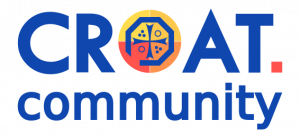Vocabulary.
General terms most used in digital currencies and trading world.
A
ALTCOIN
Any digital currency other than Bitcoin. CROAT is an altcoin such as Litecoin, Monero.
51% ATTACK
When more than half of the computing power of the blockchain is controlled by a single agent, it can carry out malicious transactions against the network.
B
BLOCK
Data package that contains transactions that are registered in the blockchain.
BLOCKCHAIN
A blockchain is a system that stores a copy of all transaction history in CROAT network. Periodically, a new block with the latest available transaction information is added to the blockchain. This chain allows the network to verify and validate the amount of money in the accounts (wallets) and make it resistant to attacks and attempts to centralize.
BITCOIN
The first digital currency based on blockchain technology. It was created by a person or group of people under the pseudonym of Satoshi Nakamoto.
C
CROAT
The CROAT is a digital cryptocurrency that operates on a community-based value standard using P2P (peer-to-peer) networks as a means of conducting transactions. Instead of having a central authority to determine the value of the currency, its value is determined by the number of products and services that people are willing to buy or sell using Croats. Croats have a global value, so they can be used in any country, at any time. Croat is also open source; its architecture is public, nobody owns or controls the CROAT and anyone can participate.
CROATCORE
CroatCore is a wallet/miner of the virtual currency Croat. Keep track of all the croats you have sent and received and allow you to spend Croats comfortably. CroatCore also serves to make coin mining.
CONFIRMATION
Action carried out by the miners that verifies a transaction and adds it to the blockchain.
PRIVATE KEY
Data set that allows access to the digital currency in a wallet. It serves as a password that must be kept hidden from other people.
PUBLIC KEY
Key that is used to encrypt a transaction in the blockchain network.
CONSENSUS
It happens when all the participants of the network agree on a chain of transactions, which ensures that all the nodes have an exact copy of the same record.
TRANSACTION FEE
Fee or rate that is paid to miners to process a transaction with digital currency.
D
PUBLIC ADDRESS
E
BLOCKCHAIN EXPLORER
Online tool that serves to view transactions in the blockchain.
F
FUNGILITY
Fungibility is a simple property of money, in such a way that there are no differences between two amounts of the same value. If two people wanted to exchange a ticket of 10 and two of 5, then no one would lose. However, we assume that everyone knows that the 10 ticket was previously used in an illegal and marked action. The other person would make the change? Probably not, even if the person with the 10 has nothing to do with the illegal action. This could be a problem, because the money recipient would need to constantly check the money they are receiving so they do not end up with "dirty" money. Croat is fungible, which means that people do not need to go through this effort.
M
MINING
Mining is the process by which the information about a distributed transaction within the Croat network is validated and added to the blockchain. The miners are rewarded for all transactions they process. There are fees associated with all transactions that validate and include in a block.
Mining is a process that takes time and becomes increasingly difficult as time passes and new blocks are added to the blockchain chain, as well as more and more users to the Croat network. It's a kind of competition. On the one hand, at first, with few users, it can be very easy to obtain large quantities very quickly. These amounts will decrease over time. On the other hand, the more miners there is, the bigger the stronger the Croatian system, which leads to a greater value of the currency.
N
NODE
Copy of the registry operated by a network computer.
R
CENTRALIZED LEDGER
Ledger maintained by a central agent.
DISTRIBUTED LEDGER
Ledger where the data is stored in a network of decentralized nodes.
BLOCK REWARD
Payment in CROATS that the network grants to a miner who successfully calculated the hash of a block.
